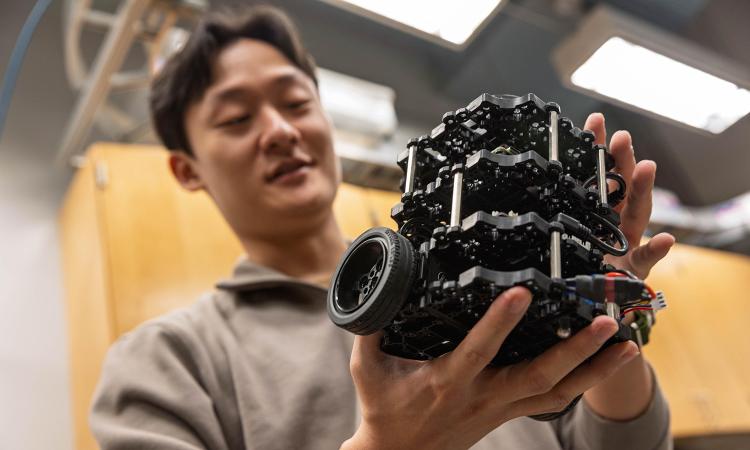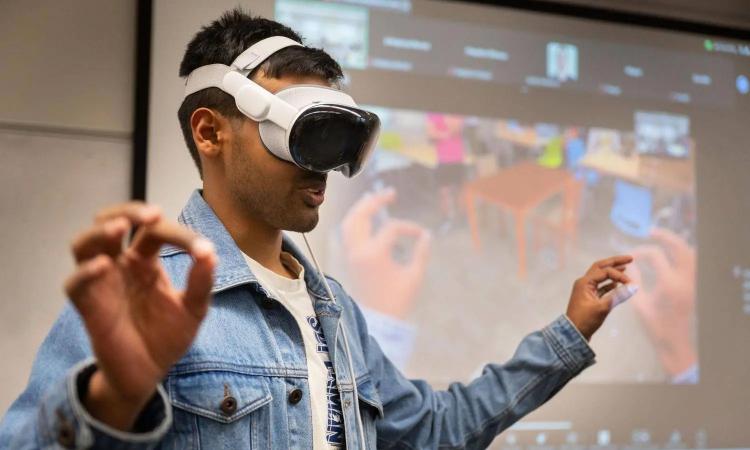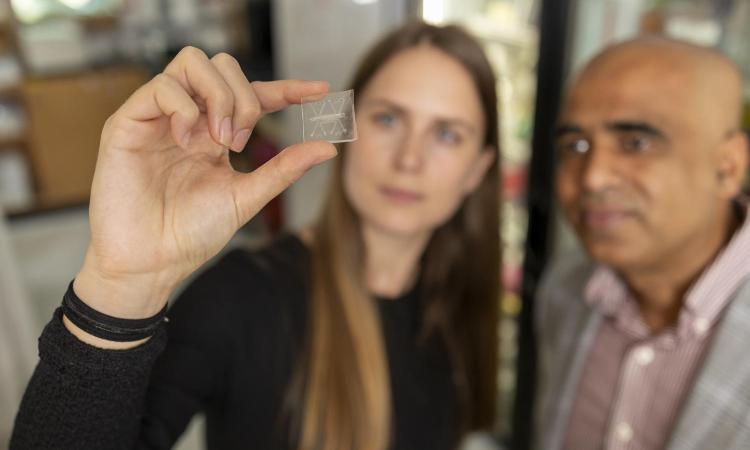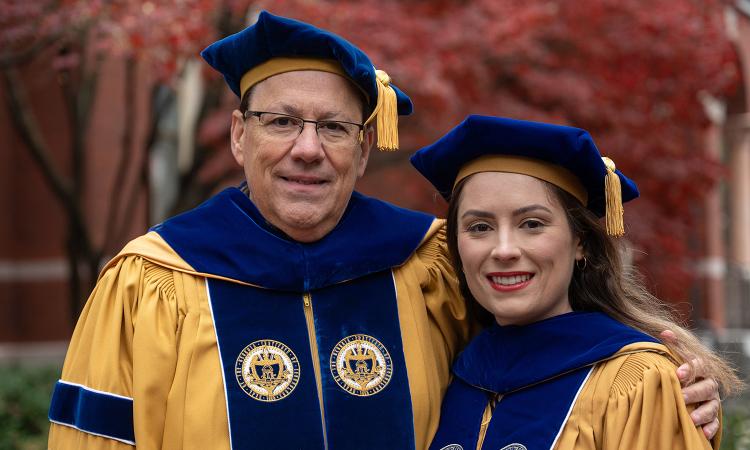Georgia Tech’s College of Engineering consistently produces articles, content, and videos highlighting our students, staff, faculty, and research. This includes stories about artificial intelligence, robots, engineering systems, space exploration and rockets, medical advances, and more.

Maaz Dossa Named to Aviation Week’s 20 Twenties
The magazine recognized the aerospace engineering student for his potential to reshape aerospace, aviation, and defense.
The magazine recognized the aerospace engineering student for his potential to reshape aerospace, aviation, and defense.

Researchers Warn AI ‘Blind Spot’ Could Allow Attackers to Hijack Self-Driving Vehicles
A newly discovered vulnerability could allow cyber criminals to silently hijack the AI systems in self-driving cars, raising concerns about the security of autonomous systems increasingly used on public roads.
A newly discovered vulnerability could allow cyber criminals to silently hijack the AI systems in self-driving cars, raising concerns about the security of autonomous systems increasingly used on public roads.

Researchers Expose Hidden Cybersecurity Risk in Mobile Robots
Mechanical engineer Jun Ueda has demonstrated that an undetectable cyberattack is surprisingly easy to execute, making the robot behave incorrectly while convincing the controller everything is fine.
Mechanical engineer Jun Ueda has demonstrated that an undetectable cyberattack is surprisingly easy to execute, making the robot behave incorrectly while convincing the controller everything is fine.

Wearing the Future
From smart textiles to brain-computer links, Georgia Tech engineers are designing wearables that connect humans and machines more closely than ever to sense, respond, and heal.
From smart textiles to brain-computer links, Georgia Tech engineers are designing wearables that connect humans and machines more closely than ever to sense, respond, and heal.

Sleepless Tutor Turns Midnight Panic Into Progress
ECE instructors have created an AI tutor that guides students through problems step by step, checks their reasoning, references class notes, and flags mistakes.
ECE instructors have created an AI tutor that guides students through problems step by step, checks their reasoning, references class notes, and flags mistakes.

Search Begins for Next Dean of Engineering
The search committee chaired by Computing Dean Vivek Sarkar will start the process with a series of town halls to collect input from the Georgia Tech community.
The search committee chaired by Computing Dean Vivek Sarkar will start the process with a series of town halls to collect input from the Georgia Tech community.

Better Brain-Machine Interfaces Could Allow the Paralyzed to Communicate Again
Biomedical engineer Chethan Pandarinath collaborates with neurosurgeons and scientists across the country in a massive project to help patients with ALS or stroke damage reconnect with the world.
Biomedical engineer Chethan Pandarinath collaborates with neurosurgeons and scientists across the country in a massive project to help patients with ALS or stroke damage reconnect with the world.

How Georgia Tech Students Are Bringing Water Sustainability to Nepal
Students in Engineers Without Borders are partnering with a rural community in Nepal to design a system that will provide year-round access to clean water.
Students in Engineers Without Borders are partnering with a rural community in Nepal to design a system that will provide year-round access to clean water.

Apple Vision Pro Powers New Wave of Immersive Education
The virtual-reality headsets are introducing spacial computing to ECE courses, blending digital content with the physical world and helping students see the unseen forces that underpin electrical and computer engineering.
The virtual-reality headsets are introducing spacial computing to ECE courses, blending digital content with the physical world and helping students see the unseen forces that underpin electrical and computer engineering.

Digital Doppelgängers
Engineers are building computerized replicas of cities, and even Georgia Tech’s campus, to save lives and create a better, more efficient world for all of us.
Engineers are building computerized replicas of cities, and even Georgia Tech’s campus, to save lives and create a better, more efficient world for all of us.

Six Yellow Jackets Named to Forbes 30 Under 30 List
Five engineering alumni and an engineering researcher were chosen from more than 10,000 candidates for their contributions to aerospace, energy, and green tech.
Five engineering alumni and an engineering researcher were chosen from more than 10,000 candidates for their contributions to aerospace, energy, and green tech.

Georgia Tech Climbs to No. 2 University in Federally Sponsored Research Expenditures
It's the highest-ever ranking for Tech, which remains the top university for federal research spending among those without a medical school.
It's the highest-ever ranking for Tech, which remains the top university for federal research spending among those without a medical school.

Behind the Wheel and Around Town, We’re Moving Toward a Connected, Autonomous Future
How we get around is changing as new options like autonomous vehicles arrive in earnest. Srinivas Peeta works to unravel what that means for our communities and how we plan for a more connected future.
How we get around is changing as new options like autonomous vehicles arrive in earnest. Srinivas Peeta works to unravel what that means for our communities and how we plan for a more connected future.

More Power, Less Heat
As an electrical and computer engineering Ph.D. student, Edgar Garay reimagined how chips called power amplifiers could work. His startup company based on that innovation has raised millions in capital to disrupt a $23 billion dollar industry where designs haven’t changed much in decades.
As an electrical and computer engineering Ph.D. student, Edgar Garay reimagined how chips called power amplifiers could work. His startup company based on that innovation has raised millions in capital to disrupt a $23 billion dollar industry where designs haven’t changed much in decades.

Smaller, Smarter, Speedier, Stacked: Engineering Next-Gen Computing
Some technologists suggest we’re nearing the limits of packing ever-more computing power into ever-smaller chips. At Georgia Tech, engineers are finding new ways to shrink transistors, make systems more efficient, and design better computers to power technologies not yet imagined.
Some technologists suggest we’re nearing the limits of packing ever-more computing power into ever-smaller chips. At Georgia Tech, engineers are finding new ways to shrink transistors, make systems more efficient, and design better computers to power technologies not yet imagined.

Rivian Announces Scholarship Program for ECE, ME Students
Rivian Scholars will receive tuition support and internship opportunities as the company deepens roots in Georgia.
Rivian Scholars will receive tuition support and internship opportunities as the company deepens roots in Georgia.

Mastering Clean Water
Antonia Kopp wants to use her environmental engineering master's degree to ensure that Atlanta’s water system flows as it should.
Antonia Kopp wants to use her environmental engineering master's degree to ensure that Atlanta’s water system flows as it should.

Divan, Raychowdhury Named National Academy of Inventors Fellows
The researchers are receiving the top honor for their innovations in advancing power grid modernization and semiconductor design.
The researchers are receiving the top honor for their innovations in advancing power grid modernization and semiconductor design.

60 Years Later, Finally Another Yellow Jacket in the Family
Peter Petrecca has been the lone Georgia Tech engineer in his family for decades. That changes in December when his grandson graduates exactly 60 years after Petrecca finished his degree.
Peter Petrecca has been the lone Georgia Tech engineer in his family for decades. That changes in December when his grandson graduates exactly 60 years after Petrecca finished his degree.

Father and Daughter Celebrate Triple Jacket Milestone
When Sophia Mavris crosses the stage during Georgia Tech’s Fall 2025 graduation ceremonies, she won’t be the only member of her family in regalia.
When Sophia Mavris crosses the stage during Georgia Tech’s Fall 2025 graduation ceremonies, she won’t be the only member of her family in regalia.
Pagination
- Current page 1
- Next page